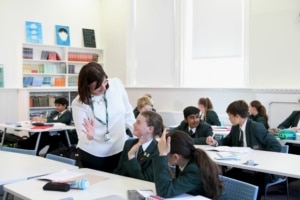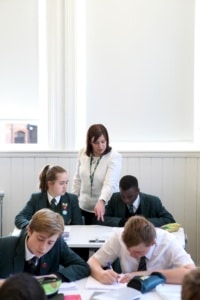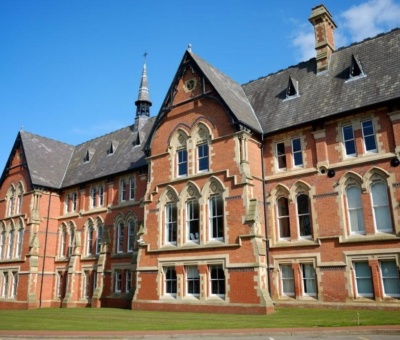The Power of Reading – Mrs Gregory (CHS Teacher, English)
by Mrs Catherine Gregory, CHS Teacher of English
‘A room without books is a body without a soul.’ – Cicero
There are few activities that receive such relentless support from all educators than the value that is placed on reading for pleasure.
Even before its impact was measured, reading was widely known to benefit the mind and soul. In today’s world of action research, the link between reading for pleasure and confident literacy skills, cognitive development and social growth is indisputably strong.
It does not stop there. Being a ‘reader’ even has impact on life chances as Daniel Rigney in his book ‘The Matthew Effect’ points out. Those who have all the riches that reading affords are more likely to enjoy gainful employment, acquire new skills very rapidly, and quickly move from learning to read to reading to learn.
If children read for pleasure habitually then they provide themselves with self-generated learning opportunities that are equivalent to several years of education.

The very act of reading demonstrates a certain habit of mind that is conducive to the levels of focus required for challenging work. Indeed, reading resilience is essential for success in every aspect of the curriculum.
As a teacher, I believe I have a moral obligation to facilitate reading success for every student, to foster a love of reading and model reading activities myself. I want students to see me reading and make them curious about the world I have temporarily inhabited.
The idea for this article came when I was reading a book in my classroom. I was immersed in a particularly funny chapter of ‘The Girl Who Saved the King of Sweden’ which resulted in me laughing out loud. The students, who had started to drift in unnoticed from their various lunchtime activities, were immediately curious. They interrupted my reading to find out what was the cause of my amusement. Curiosity had been piqued and they too wanted to be a part of the fun that I was so apparently having. The same happened when I told my Year 10 reluctant readers that I had just finished a novel that had made me cry. The disbelief that I had shed ‘real’ tears soon gave way to a strong desire to see if they too were moved. From my own youth, I can remember that teenage desire to experience strong emotions and the want to find occasions to do so. Now I am a parent myself, I cannot think of a safer and more beneficial pass-time that affords such opportunities than reading.

The power of reading is felt in a real way and it shapes who we are. When I was at school, iPads and mobile phones did not exist. Long journeys on the school bus were spent reading and sharing copies of novels such as Virginia Andrews’ ‘Flowers in the Attic’. We could debate her worth as a novelist but the point is that my friends and I learnt about relationships, debated the situations that occurred on her pages and unknowingly improved our reading speed – all before 8am in the morning.
Literature sustained me throughout my teenage years. The novels and poetry I read were in an attempt to understand myself. I found kindred spirits in the characters I met. I admired Elizabeth Bennett, a young woman determined to make her own way and refuse to conform to what society expected. I rejoiced in her declining Mr Collins’ offer of arriage, despite the financial security it would have provided. Similarly, after visiting the Bronte parsonage in Haworth and reading ‘Jane Eyre’, her proclamation that “I am no bird; and no net ensnares me: I am a free human being with an independent will” shaped the emotional understanding I had of my future.
As I became older and more independent, I was inspired to travel and learn more about the world. Quite simply, this inspiration came from the novels I had read. There were places I had to visit and during one particular long haul flight I read ‘Birdsong’ by Sebastian Faulks. The love story during Part One held my attention for hours. Part Two moved me in a way that no history book could ever attempt to do. It was the late 90s and held in the tight confines of ‘economy’ seating, I experienced the terror of the First World War. I could hardly breathe as Stevens, trapped underground near enemy tunnels, came face to face with German soldiers. I was so moved by this story that I handed it to the gentleman sitting next to me and insisted he read it too. My students today will testify that I continue to ‘pass on’ this novel.
The real power of reading, therefore, lies beyond the bounds of any academic achievement. Instead, it is in the “lighting up” of the brain. Scientists discovered this when studying the neurological effects of reading; a spark is ignited that forms new pathways. And yet, it is much more than anything that could be measured or explained in a scientific journal. The physiological and psychological benefits of reading are the greatest gifts from this simple act. With a good book you are never alone, as Hector in Alan Bennett’s ‘The History Boys’ explains so perfectly:
“The best moments in reading are when you come across a something – a thought, a feeling, a way of looking at things – which you had thought special and particular to you. And now, here it is, set down by someone else, a person you have never met, someone even who is long dead. And it is as if a hand has come out, and taken yours.”
Hector tells the boys to “pass it on.” And as a Teacher of English sharing my love of great literature is something I aim to do every single day; it is too powerful to keep to myself.


